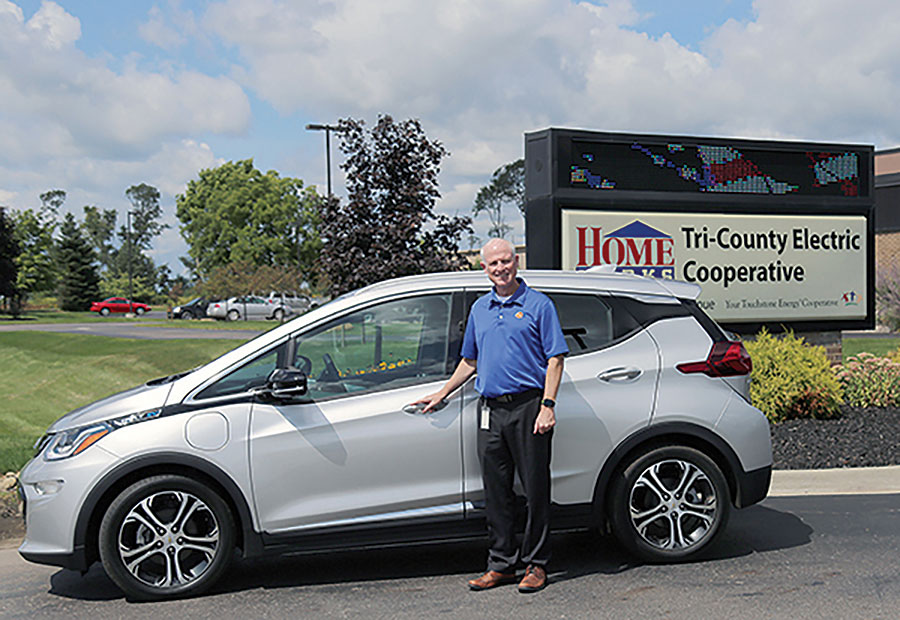Electric vehicles remain a hot topic in 2019, as the purchase and use of EVs has fast-tracked in popularity across the country. In rural Michigan, electric co-ops are keeping a close eye on the EV industry and can serve as a good resource if you have questions about purchasing one this year. Meet two co-op members on these pages who drive electric vehicles themselves, and learn how this shift in transportation has made financial and environmental sense for them.
 Mark Kappler
Mark Kappler
General Manager, HomeWorks Tri-Countr Electric Cooperative
Electric Vehicle: 2017 Chevy Bolt
I recently made the decision to purchase an electric vehicle for personal use. Before choosing to go electric, my wife and I carefully considered several factors, including what our primary use of the vehicle would be. But once we did the research and weighed the pros and cons, all signs pointed towards the Chevy Bolt.
As we analyzed the way we used our existing small car, for short trips to the grocery store, to work and school, to events at Michigan State, etc., we found that the Bolt’s maximum mileage range of 238 miles per charge would more than meet our needs. We worked it out and realized the lower operating costs of the vehicle would result in a cost savings for us. After that, the decision was easy.
Probably the biggest misconception regarding electric vehicles is the range anxiety that can come from not understanding how people use their current vehicles. Studies have shown that most people use their vehicles for shorter trips most of the time. My wife and I have a small SUV that we use for long trips and more carrying capacity, but for short trips, which make up the majority of our driving, we use our electric car exclusively.
As a new EV-owner, I would encourage any co-op member purchasing a new vehicle to consider an electric vehicle.
 Jim MacInnes
Jim MacInnes
CEO, Crystal Mountain
Chairperson, Michigan Utilities Consumer Participation Board
Electric Vehicle: 2017 Tesla Model S 100D
As the Chief Executive Officer and co-owner of a ski resort I can tell you that global warming is, simply put, bad for business. Widespread adoption of vehicle electrification represents one of our best opportunities to mitigate these effects while also generating significant savings.
We’ve long advocated for EVs and their tremendous environmental and economic potential. Crystal was the first northern Michigan resort to offer complimentary charging stations—we now have five. My first electric vehicle was the Chevy Volt which is now one of our security vehicles. Today, I drive a Tesla and Crystal Mountain is part of its Destination Driving Program. Our EV chargers have attracted new guests to the resort, including at least a half dozen electric vehicles on display during Memorial Day Weekend’s Michigan Beer & Brat Festival.
For a start, electric vehicles are way more energy efficient and have a lot fewer moving parts. This makes them mechanically simpler and less subject to breakdown. They have software that can be updated over the internet. So, rather than becoming obsolete, they will improve over time—much like your phone.
Michigan’s utilities and cooperatives are well positioned to help lead the charge and benefit from investing in and incentivizing EVs and their charging infrastructure while also saving money for ratepayers. We are extremely proud of our partner in Cherryland Electric Cooperative. Their commitment to a
56 percent carbon-free energy portfolio is vital to a sustainable energy and environmental future.
Do you drive an electric vehicle?
Please email editor@countrylines.com with your contact information (name, email, phone number, electric co-op) and a brief testimonial outlining your personal experience driving an EV. Someone from the magazine may call or email you to interview you and possibly feature your story in an upcoming article.






